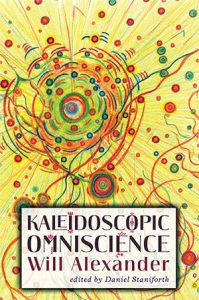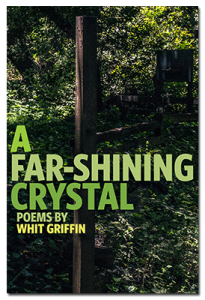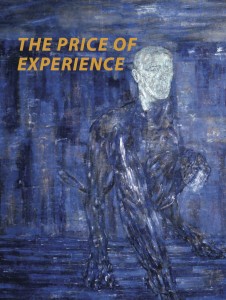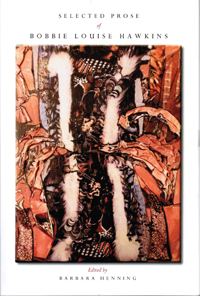The Selected Letters of Robert Creeley
 The Selected Letters of Robert Creeley
The Selected Letters of Robert Creeley
Edited by Rod Smith, Peter Baker, & Kaplan Harris
University of California Press 2014
512 pages / $65 Buy from Amazon or University of California Press
The Selected Letters of Robert Creeley is an engaging, thoroughly worthwhile selection of the poet’s correspondence spanning his complete life. The editorial work done here is quite impressive. The only areas to be possibly improved upon would be further notes in the back of the book and more illustrations. The letters span some sixty odd years, so although Creeley is perhaps one of the greatest over-photographed poets of our time it seems appropriate to have at least one photograph per decade. As it is there’s about three, including the photo on the cover. It is admittedly difficult to locate yet-unseen images of him, but several pages of reproduced letter manuscripts or perhaps images of this or that difficult to obtain publication would have sufficed instead. And it proves difficult not to wish for some further elaboration upon the minimal notes included. Not every reader has the book open next to the computer to take advantage of Wikipedia and Google. Yet as stated the overall skilled arrangement of the whole book is such that these are minor quibbles.
Creeley himself well understood the massive assembling project that any selection of his letters represented. Writing to editor Rod Smith, Creeley describes his sense of how “some general ‘map’ or sense of focus or parameter would be the first need.” He then immediately suggests the then-recent “selection of [Charles] Olson letters–or Gregory’s, just out from ND” as some examples of what he has in mind as successes. The latter volume, An accidental autobiography: the selected letters of Gregory Corso (New Directions “ND” 2003), I fondly recall a poet-pal curling up with in bed while down LA’s Chinatown for a reading, a small group of us having driven down for the event.
Creeley’s Selected, however, easily outshines my experience of reading Corso’s correspondence. This is no small feat given that so little is readily available concerning Corso, while material on Creeley is quite plentiful. I say this having an equal interest in both poets and having read ALL available material on each of them. Corso’s letters, for all his charm, are just too repetitive. They round out the experience of his poems but are ultimately as inhibited by his vices as the poems too often sadly prove to be. On the other hand, Creeley’s letters truly offer all that any of his readers might imagine and more. Not that Creeley didn’t indulge his share of vices: mention of numerous illicit substances make repeated revolving door appearance in the letters as do his (nearly) overlapping romances and marriages.
As a persistent reader of all things Creeley I would have thought there was little to be newly discovered about his life and writing. But the letters quickly prove just how wrong it is to make such an assumption. The simplest of fresh things I’ve come across is Creeley’s repeated use of “voila” throughout his correspondence. He’s usually using it as a turn of phrase to sum up his recounting of some recent excitement to a correspondent. Often it occurs near either the conclusion of the entire letter or some lengthy passage in particular, as if to say “see what I mean! And so now:” before continuing on to his next thought.
This reoccurring word appears early on in the letters and at first had me thinking it was something he just tried out which would then disappear as time went by; but I found it continued throughout decade after decade. This caught my attention because it is not a regularly used figure of speech I’ve found in any of Creeley’s other writings, poems, published interviews, essays, etc. where appear an abundance of what I term Creeleyisms. Familiar phrasal patterns to which he easily returns over and over again, yet the “voila” is present just in his correspondence. My new found Creeleyism: Voila.
April 14th, 2014 / 10:00 am
Kaleidoscopic Omniscience by Will Alexander
 Kaleidoscopic Omniscience
Kaleidoscopic Omniscience
by Will Alexander
Skylight Press, 2013
274 pages / $21.99 Buy from Amazon or Skylight Press
What is in essence a collected early works Kaleidoscopic Omniscience gathers together Will Alexander’s early collections Asia & Haiti and The Stratospheric Canticles along with a long-promised but never published collection of shorter poems Impulse & Nothingness.
Vermillion shades of astral haunts abound as Alexander takes his readers through a psychedelic romp that leaves the consciousness reeling. There’s nothing usual about Alexander’s visionary take on history: the contemporary, the ancient, and the yet-to-be-possible-yet-possibly-not all come together simultaneously happening in the immediate now of his poems. Welcome to the sci-fi gothic splendor that is Alexander’s forte.
This is news from the beyond gathered by a shamanic visionary. Spun from out his psycho-imaginative journeys through previously unheard realms of existence. All grounded within his particular chthonic as well as vatic orders. He’s listening to frequencies to which few others are privy. (Too few others.) The messages conveyed by his poems are imbedded beneath soaring tonalities and scattered throughout lines with cryptic zeal.
Both “Asia” & “Haiti” are epic in scope. The ghosts of silenced communities spanning a global axis of oppression and denied freedom are given voice. The poems from beginning to end are one long address.
the once green wings of magical Tibet
accused by the Maoists
by the exterior flames of ideology & assault”
(“Asia”)
And
with a sun of splinters spewing from our heart
from our thorax burning with intestinal moray explosion
we
the Africa of Songhai & Mali
we
of original reptile wisdom
we
the first gatherers of wool
through sun
through apertures spinning
in a ruptured lightning gorge”
(“Haiti”)
The spirits of “Asia” announce “we’ve emerged / with our murmurs” carrying their stories into the public address of the poem.
the old fiery Lamas from the ocean
from the great green thrones of infinity”
March 10th, 2014 / 11:00 am
A Far-Shining Crystal by Whit Griffin
 A Far-Shining Crystal
A Far-Shining Crystal
by Whit Griffin
The Cultural Society, 2013
70 pages / $15 Buy from SPD or The Cultural Society
…you can’t escape history – whatever you do, history informs and shapes you and your concept. Maybe to some degree you can push something somewhere, because all of our brains are unique structures of nature you can’t even play a lick like somebody else did, even if you’re expert at copying somebody what you’re doing is different by the nature of your brain chemistry. So all that’s to say that you can’t escape history because it presses down and weighs on you, the whole history of the universe, and it is also – I don’t want to say it’s moving forward because it’s not going anywhere, it just IS – but it is now.
– Matthew Shipp
Widely engaging, Whit Griffin confronts history as if a parlor trick turned serious. His poems offer counsel which surprises and confounds, conjuring disparate items of new and old lore at will. Griffin mixes together a celestial grab bag of cross cultural myth and magic presenting a head spinning engagement with what’s more or less generally recognizable as occulted literature. The structural supports he relies upon in terms of content are at once both factual and imagined. This poetry both is and is not a guide to esoteric knowledge. In Matthew Shipp’s words, “it’s not going anywhere, it just IS – but it is now.” Griffin reaches out to grab anything and everything speaking to the moment of the poem. He relentlessly spins the wheel of reference, plucking off correspondences as needed in an inspired bit of poetic magicking.
Collaging together lines heavy with symbolic imagery, Griffin tests intuition against imagination. Under Griffin’s care the affair of writing poems turns into an alchemical sleight of hand. The poems are listening to themselves go, line-by-line propelling a state of constant revelation yet refusing to reveal anything. Every set of lines are rungs of a ladder which lead only to further rungs. There’s plenty here for readers, along with the poet, to disappear into again and again. A revisiting ritual gets enacted on every page. Peel back one layer and you find yourself peeling it off again a few pages later.
These poems arrive full of many talismans. “Stone” is one of many words which, appearing throughout in individual lines and titles of poems, comes to take on properties similar to the sigil. For instance, there’s a poem, “Stone Called Jet” opening “As Blake is to yellow…” and in the poem “Bigger than the Material” mid-line we find: “A stone is a swifter.” While in a poem entitled “The River of Milk, the Snake Canoe” we get the following informative and detailed info:
out of stone. The force that formed the
stone can also dissolve it. Bacchus turned
the amethyst red. No god, but the translator,
turned Andromeda into a dromedary.
Tamberlane’s tent turned from white to red.
Red stones do not appeal to idealists. Roman
widows wore white. Rosicrucians believe iron
is the product of dark powers. The sly fox in
sympathy with the wily god. The lame god
is the provider of all good things.
The poem rolls on as one reference folds into the next, in the process unfolding one meaning in order to form another. Each line sparking off the one previous, springing a new set of thoughts reaching yet further afield as the poem runs down the page. Later this same poem tells us “There are seven amulets known / to all seafarers.” Continuing on to mention many specific stones: jade, coral, sapphire, turquoise, malachite, crystal, and the relations of stone-like objects: “Every tree trunk becomes a gnomon. Lost a gnomon, / gained a swearing hole.” The mark left by way of a protruding absence. There’s then a turn towards listing incredible what-if occasions, such as “To stroll with William Blake himself, and hear him speak / of the icelike Yuccas.” Before ending, “When he died his skull became the sky.” Matter of fact truth laid bare, plain as day.
November 1st, 2013 / 11:00 am
Price of Experience by Clayton Eshleman
 Price of Experience
Price of Experience
by Clayton Eshleman
Black Widow Press, 2012
483 pages / $24 Buy from Amazon or Black Widow Press
The Price of Experience is a broad sampling of Eshleman’s prodigious output in a variety of literary forms: poems, letters, interviews, book reviews, essays on contemporary art, and lectures on ice age cave art, are all brought into the mix alongside various memoir bits and notes on his numerous translation as well as editorial projects. (Eshleman indispensably translates the poetry of both César Vallejo and Aimé Césaire, among others. He also edited the seminal journals Caterpillar and Sulfur.) This would be considered an “Eshleman Reader” if only somewhat incredibly it didn’t follow on the heels of Black Widow Press’ previously published The Grindstone of Rapport: A Clayton Eshleman Reader (forty years of poetry, prose, and translations). Meanwhile, it also looks forward to their publication of Penetralia (a fifty-seven-year poetry retrospective) in 2015. It’s daunting (and perversely thrilling) to imagine what the page count for the upcoming “retrospective” might turn out to be as the other two books come in at around 500 pages each.
Eshleman grabs his book’s title from lines of William Blake’s The Four Zoas and the lesson expounded by the work of the poet-mystic-printer is ever apt. Eshleman quotes an extensive passage, but here are the opening lines:
Or wisdom for a dance in the street? No it is bought with the price
Of all that a man hath his house his wife his children
Wisdom is sold in the desolate market where none come to buy
And in the witherd field where the farmer plows for bread in vain
In essence, given this epigraph, which ends “It is an easy thing to rejoice in the tents of prosperity / Thus could I sing & thus rejoice, but it is not so with me!” Eshleman seeks to frame this retrospective accounting of his work in a fashion which demonstrates how thoroughly his writing arises quite literally from struggles surrounding the circumstances in which he’s lived. There should be no doubting that Eshleman has done his fair share of downward scraping into the barrel of experience, bottomless as it may be. He has always returned to his work positioning his imagination via writing in the hands of forces over which he often feels no control. The resulting discoveries astound him as much as anybody else. In fact, they sometimes astound him quite a bit more than they likely do anybody else.
The limits of Eshleman’s writing arise when his impulse for self-expression overrides and self-indulgence swells within him, his proclivity for excess then gets the better of him. One case in point: while detailing his relationship with poet Paul Blackburn, Eshleman describes how his own personal demands tore him away from composing a poem for Blackburn’s second wedding and instead turned him towards writing a massive poem—as yet unpublished in its entirety—full of his working through deeply personal psychological material from out his own past.
August 2nd, 2013 / 11:00 am
2012 by Joanne Kyger
 2012
2012
by Joanne Kyger
Blue Press, 2013
$10.00 / Buy from Blue Press
Joanne Kyger periodically taught in the now defunct Poetics Program at New College of California, much as she still teaches now and then at Naropa. Over a decade ago I had the pleasure of being a student in one of those classes. We officially focused on “the serial poem” reading books by Jack Spicer, Ed Dorn, Alice Notley, and Ed Sanders, but more vitally the class was an uncompromising lesson in the wider practice of living—with poetry happening to be our focus—one among many of life’s daily occurrences.
A serial poem in its own right, 2012 exemplifies how fluidly Kyger’s writing practice is a sustained fact of her life. This journal-like suite of nine poems, presented in chronological order with dates of composition, is well representative of her ongoing engagement with the world via poetry over the last half-century. The writing is finely sculpted if often deceptive in giving off a carefree it’s-all-no-big-deal vibe. Of course, the simultaneous action of these characteristics only contributes towards how totally great the poems actually are.
Reading Kyger’s work is to take part in sharing her daily intimacy concerning wildlife, gossip, books read, current events, past memories, friendships, and more, all balanced by her keen awareness of detail. Observation is her abiding practice and discipline. Who’s that and what’s it doing?
The deer here spend all their lives
in a two mile radius.
The back yard is
ankle deep in pellet poo
They are practically domesticated
The fearless male quail hops right over
the red shafted flicker
pecking the new grass.
(“The Epic of World Mythology” Dec 26, 2012)
May 24th, 2013 / 11:00 am
On Bobbie Louise Hawkins
 Selected Prose of Bobbie Louise Hawkins
Selected Prose of Bobbie Louise Hawkins
Edited by Barbara Henning
BlazeVOX Books, 2012
391 pages / $18 Buy from BlazeVOX or Amazon
&
Fifteen Poems
By Bobbie Louise Hawkins
Belladonna, 2012
51 pages / $12 Buy from Belladonna
Bobbie Louise Hawkins writes some enlivening good times prose. Her writing skirts the not so fine line between fiction and non-fiction. Often composed in the form of short vignettes and based on either a story she’s been told or off events she’s herself experienced, nothing Hawkins writes is ever just made up. It all more or less happened somewhere to somebody and that’s much of what’s so endlessly charming about her work. It matters. It sticks to your guts like a good meal should. This is necessary news about living:
One evening when Velma and I were kids and were playing in the half dark of the front porch it started to look as if there was some big fire in the far distance. The sky glowed red and the glow became larger until it took up half the sky in that direction. And in the wake of the colour rose an enormous full orange moon. Texas full moons have the gift of being seen the instant they surface.
Stand in a perfect half circle. The far line of the horizon is exactly horizontal. That line extends as far as you can see, left or right. Below that line is one colour, above it is another colour. You are standing on the exact line of it. Your feet are on the earth and your head is in the air. Roughly speaking you are a 90° vertical line. You are a definite addition to the landscape, that is you are holding down that piece of ground and you’re human.
(“From Abilene to Lubbock…”)
October 8th, 2012 / 12:00 pm
